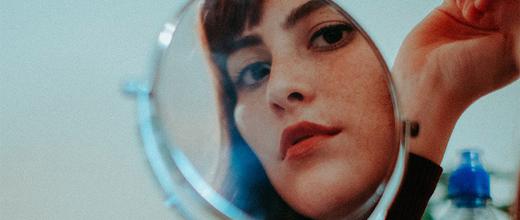The views expressed in our content reflect individual perspectives and do not represent the authoritative views of the Baha'i Faith.
Is it vain to care about your appearance—or could it be just another way of being spiritual?
When we consider vanity, we generally think of focusing primarily on how we look physically—and when we think of spirituality, it usually refers to a deeper, more profound condition of the soul, one that goes beyond the mere physical. The two terms can seem, then, like opposites.
Our mental image of a pure, good person, one more in touch with the spiritual and the divine, tends to be someone with few possessions, sitting in the dust and dressed in rags while praying fervently—so elevated above the material world that they have no need to pay it any attention.
That image of detached spirituality clashes directly with the ideals of beauty society demands we follow. As a young girl, I felt constantly bombarded with different beauty ideals, most of them involving some product or another: makeup, clothes, shoes, perfume. Even in the most isolated places, young people feel the pressure to look perfect, and the definition of “perfect” always changes with the dictates of style and fashion.
But the same society tells us, especially as girls, to avoid vanity. The kind of girl who cares too much about her appearance, looks too good in selfies and spends too much time getting ready, we’re told, is shallow, self-centered and mean. Being “good,” then, seems to imply paying little attention to one’s appearance, so as to not appear vain.
What a confusing dichotomy—and one in which too many girls end up feeling caught. How do we satisfy society’s impossibly high expectations of our appearance, while also remaining spiritual, humble and unconcerned?
For a long time, I felt a little guilty whenever I indulged in buying a nice perfume, or spent too much time doing my hair or clothes. I thought I was wasting time being vain.
But it turns out, from my understanding of the Baha’i teachings, that caring about your appearance does not necessarily equal vanity. In fact, the Baha’i teachings say this:
Therefore strive that the greatest cleanliness and sanctity … should be resplendent among the Baha’is, and that the companions of God should surpass the rest of mankind in all conditions and perfections; that they may be physically and morally superior to others; that through cleanliness and purity, refinement and health, they may be the chief of wise men, and that by their affranchisement, their prudence, and the control of their desires, they may be the princes of the pure, the free and the wise. – Abdu’l-Baha, Baha’i World Faith
This kind of superiority doesn’t preclude humility, of course–that’s the moral part. But Abdu’l-Baha says that we should aspire to physical perfection as well as moral perfection. He encouraged us to have some concern about our appearance, our cleanliness, our “affranchisement”—which means freedom from dependence or addiction of any kind.
So what does physical perfection look like? For hundreds of years, people have decked out churches and temples in gold and other riches for the sake of beauty, and in the name of consumerism and the pursuit of physical attractiveness we continue to pile expensive products on our bodies. We all too easily associate luxury with beauty, which turns beauty into a decidedly material thing: a potential cause of disunity or shame, solely associated with money and power. We also know, from the Baha’i writings, never to place spiritual value on mere objects:
Our greatest efforts must be directed towards detachment from the things of the world; we must strive to become more spiritual, more luminous, to follow the counsel of the Divine Teaching, to serve the cause of unity and true equality, to be merciful, to reflect the love of the Highest on all men, so that the light of the Spirit shall be apparent in all our deeds … – Abdu’l-Baha, Paris Talks
So what about beauty that doesn’t depend on luxury? From a Baha’i perspective, we achieve optimal physical beauty not through vanity, but through purity, simplicity and cleanliness. In the Most Holy Book of the Baha’i Faith, Baha’u’llah advised us “To be the essence of cleanliness.” – p. 50. That Baha’i law includes bathing regularly, wearing clean clothes, trimming our nails, smelling pleasant, and “generally to be the essence of cleanliness and refinement.” – Ibid., p. 236.
A person whose clothes are impeccable, who is clean all over, whose nails are nicely cut, who is perfumed—that sounds like an excellent definition of beauty, and one that doesn’t depend on luxury or vanity. Anyone can achieve this, even those who have the most meagre of means.
With our hectic lives—especially if you’re a college student like me in a place with no dress code—being 100% clean and neat all the time requires some effort. It’s easy to throw on clothes haphazardly, to continuously postpone doing my nails, to purposefully ignore a stain on a jacket for the sake of convenience. But what does that say about us, and what effect does it have on our souls?
Abdu’l-Baha spoke of the relationship between our cleanliness—and therefore our physical appearance—and our spirit:
Even in the physical realm, cleanliness will conduce to spirituality, as the Holy Writings clearly state. And although bodily cleanliness is a physical thing, it hath, nevertheless, a powerful influence on the life of the spirit … The purport is that physical cleanliness doth also exert its effect upon the human soul. – Abdu’l-Baha, Selections from the Writings of Abdu’l-Baha
By caring for our physical appearance and cleanliness, we’re also caring for our spiritual health. Our body and our soul reflect one another in this respect. In reality, then, the dichotomy that forces us to choose between looking good and being good doesn’t really exist—they can build on each other.
While I can’t say I reach this standard daily yet, I do feel a sense of inner peace when I’m completely clean, neat, fresh and organized. I used to think of that feeling as vanity, but I might have been wrong all along. Maybe that sense of freshness and peace can give us a healthy sign of our spiritual appreciation for beauty—one that will help us reach a higher level of perfection in our souls, as well:
Should a man wish to adorn himself with the ornaments of the earth, to wear its apparels, or partake of the benefits it can bestow, no harm can befall him, if he alloweth nothing whatever to intervene between him and God, for God hath ordained every good thing, whether created in the heavens or in the earth, for such of His servants as truly believe in Him. Eat ye, O people, of the good things which God hath allowed you, and deprive not yourselves from His wondrous bounties. – Baha’u’llah, Gleanings from the Writings of Baha’u’llah
You May Also Like
Comments

















Clean physically and mentally is a bare minimum that does not include as I said ...earlier something like make up , clothing fashion nor perfume .
Look passed your worldly needs of feeling attractive to ones self connect with earth and god to look passed such frivolous things to attain peace.